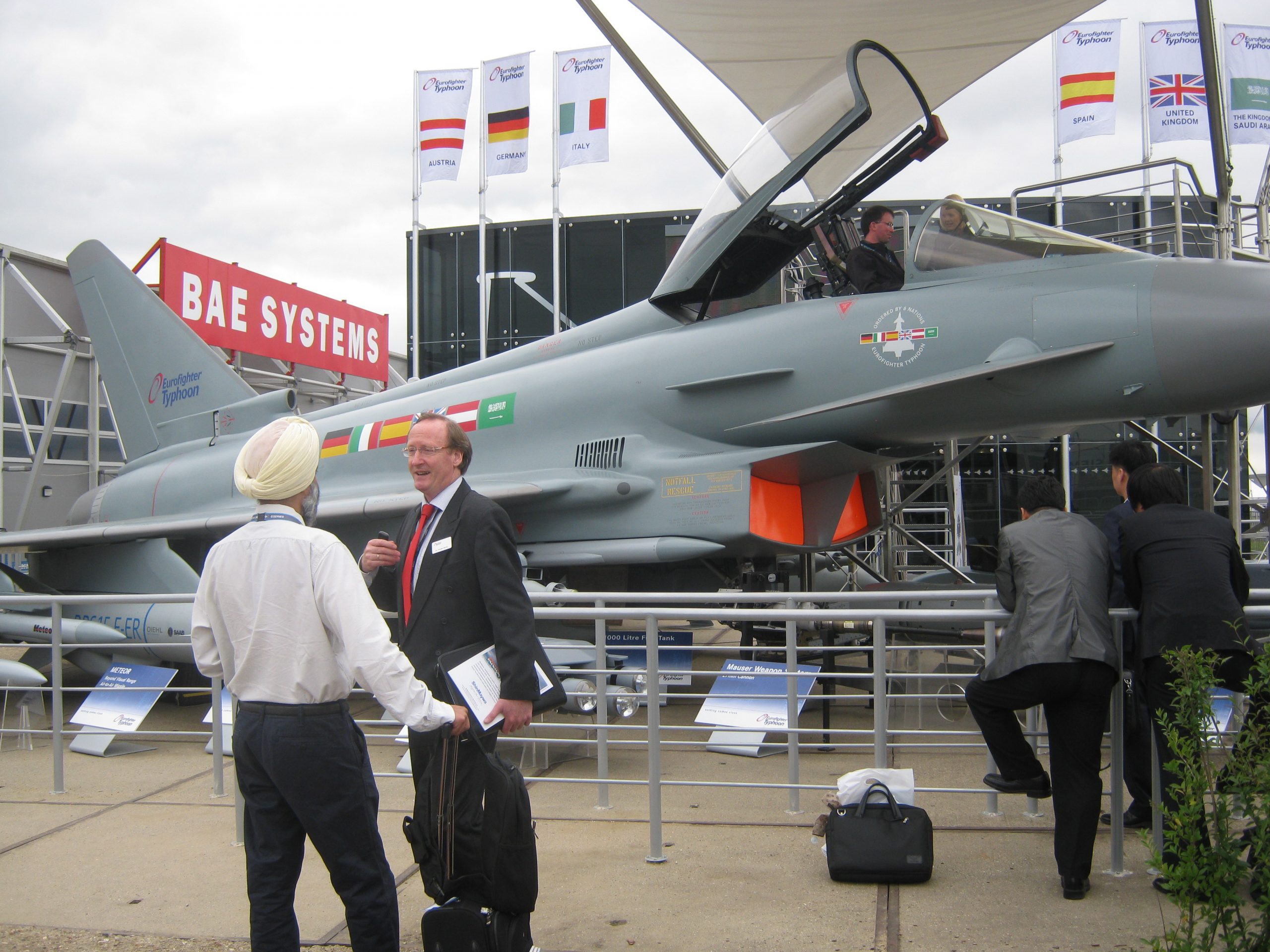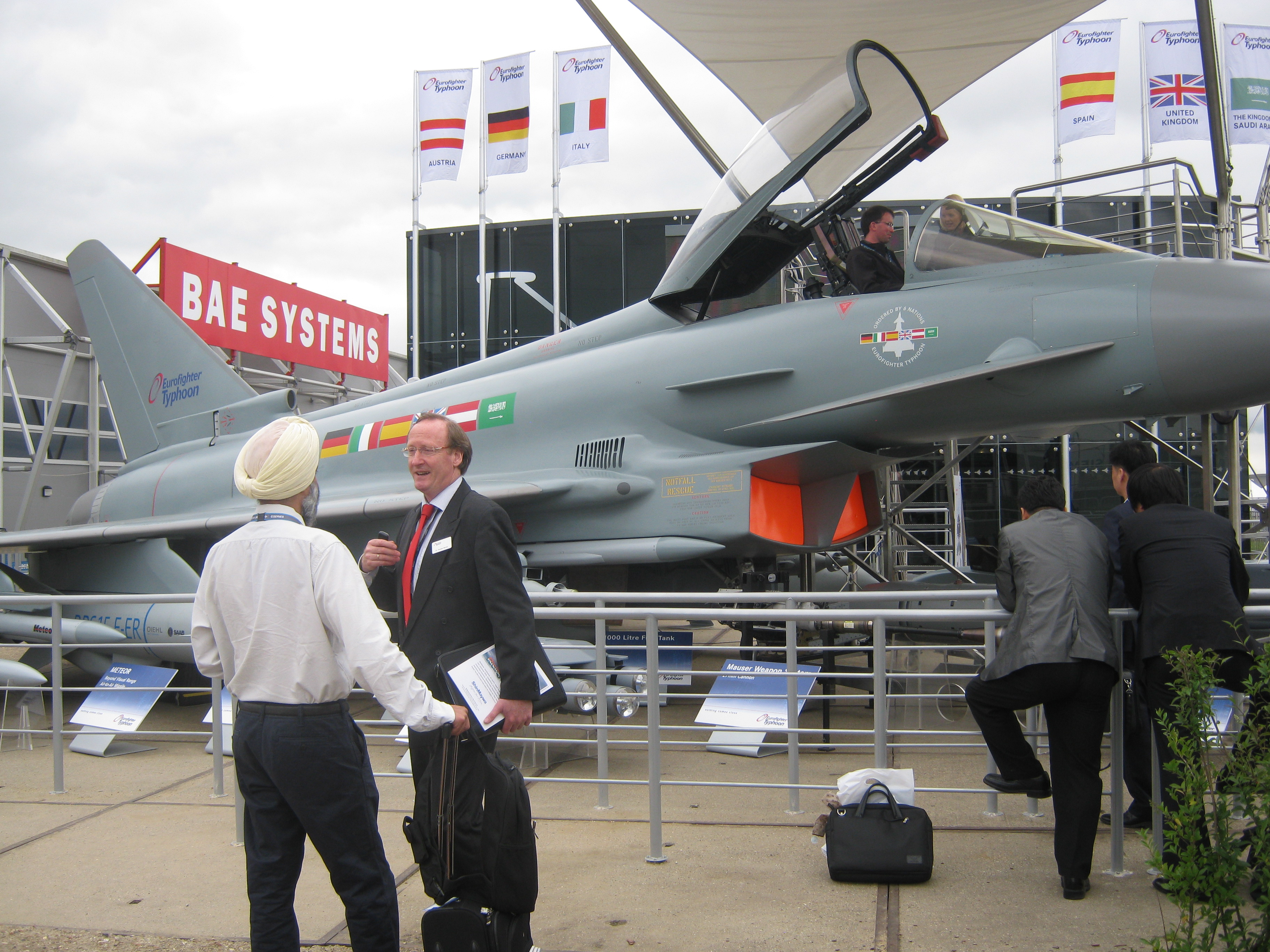David Cameron has just returned from yet another overseas trade mission – this time to India.
It’s been billed as the largest UK trade mission ever, with over 100 delegates – government ministers, MPs, “leaders of industry”, university grandees and assorted hangers-on. In the name of cementing trade ties we have seen Cameron playing cricket, laying wreaths and promising quicker visas for Indian students.
All this flummery rather disguises the main aim of the trade mission to flog arms to India, which in recent years has emerged as one of the world’s largest arms buyers. So it is worth having a closer look at who accompanied Cameron and what they might be selling.
The in-crowd
Dick Olver, Chairman, BAE Systems – BAE is one of the world’s largest arms companies and by far the largest in the UK. One of the major motives behind Cameron’s visit was to persuade the Indian government not to go ahead with its deal to purchase French Rafale fighter jets but instead buy Eurofighter Typhoons, where BAE is a major partner. BAE is notorious even in the murky world of arms companies for its alleged corrupt and unethical activities. It has the distinction of being fined record amounts by the US Justice and State Departments and the UK’s Serious Fraud Office. Its cash cow is the Middle East market, centred on Saudi Arabia – it would love to have the same set-up in India.
Robin Southwell, Chief Executive Officer, EADS UK – EADS is a French-German-Spanish consortium, which builds military and civilian aircraft. In 2011 it attempted to merge with BAE – and failed. BAE had originally been part of the Airbus consortium but it sold its 20% share in 2006 to focus on expanding its (already huge) military business.
Steve Wadley, Managing Director UK, MBDA – MBDA, part owned by BAE, EADS and Finmeccanica, makes missile systems. It contracted a £200 million deal to sell surface-to air missiles to Gaddafi’s Libya – a deal which later fell through.
John Rishton, Chief Executive, Rolls Royce – Rolls-Royce is the UK’s second largest arms company, although it prefers to emphasise its civil engineering. On its website it states proudly: “Rolls-Royce remains the second largest provider of defence aero-engine products and services globally with 18,000 engines in the service of 160 customers in 103 countries.”
Victor Chavez, Chief Executive, Thales UK – France’s largest military company, which having swallowed numerous smaller fry, renamed itself after an ancient Greek philosopher to try to change its public image. Nevertheless, it is still an arms company, with a strong emphasis on military electronics and missiles.
David Johnston, Executive Vice President of Strategy, Cobham – Cobham just makes it into the top 50 of SIPRI’s list of “Top arms-producing companies”. It manufactures weaponry, aviation and electronic communication equipment and systems, and is expanding its outsourcing service businesses.
Surinder Mongia, Managing Director, Strongfield Technologies – Strongfield describes itself as a specialist supplier of high-tech components and equipment, and engineering design and consultancy support for aerospace, defence and security programmes worldwide. Not surprisingly, Mr Mongia would much rather you know about his charitable work.
Rakesh Sharam, Chief Executive, Ultra Electronics – A anonymous name for a largely anonymous business supplying a range of military systems and components for the arms industry in over 30 countries.
Other companies such as Atkins, Griffon Hoverwork, Infosys and Serco also provide military products and services as well as civil ones.
Off the guest list
One arms company not on the delegation list is AgustaWestland Helicopters, a subsidiary of Italian arms giant Finmeccania. The reason is not hard to deduce. Finmeccanica is in big trouble in both Italy and India because of alleged bribery whereby Finmeccanica is reported to have paid Indian officials to choose AgustaWestland over a rival bidder. (Incidentally, the choppers were for transporting government VIPs, not formilitary purposes).
Now India threatens to pull the deal unless Finmeccanica can give assurances that no bribes were paid. Indian Prime Minister Manmohan Singh directly confronted David Cameron on the issue at a press conference: “I also conveyed to the Prime Minister our very serious concerns regarding allegations about unethical means used in securing the 2010 contract of the AgustaWestland helicopters. I have sought full assistance from the UK in this case. Prime Minister David Cameron has assured me of the cooperation of his government in the investigation.”
The smooth-talking Cameron was equivocal: “This is really a question between the Italian authorities – because it is Finmeccanica, an Italian company, which owns AgustaWestland – and the Indian authorities.” If the UK was in any way involved it was up to the UK’s Serious Fraud Office to take action. He then went on to praise AgustaWestland as a “brilliant company” and restate his position that he was not embarrassed to promote arms sales.
Beer and fighter jets
But it’s not just the arms company execs on-message about arms sales. You might think that the beer you quaff with your curry would have nothing to do with the Eurofighter but you would be wrong.
Listen to Lord Karan Bilimoria, Chairman of the Cobra Beer Partnership. In an interview on BBC Radio 5 Live! he was quoted as praising the Eurofighter and saying “we believe that we have the best aircraft”. You can hear more here (interview from 1:10:25)
On the parliamentary website Lord Bilimoria lists the “armed forces” and “defence” among his many interests – you can see that the first might have some connection with beer consumption but unless the Eurofighter is fuelled by Cobra beer it is hard to see the second. But it really doesn’t matter because when you are flogging arms you use any and every possible excuse to justify your support – however tenuous or farfetched it might be.
Embarrassed – not them!


